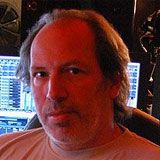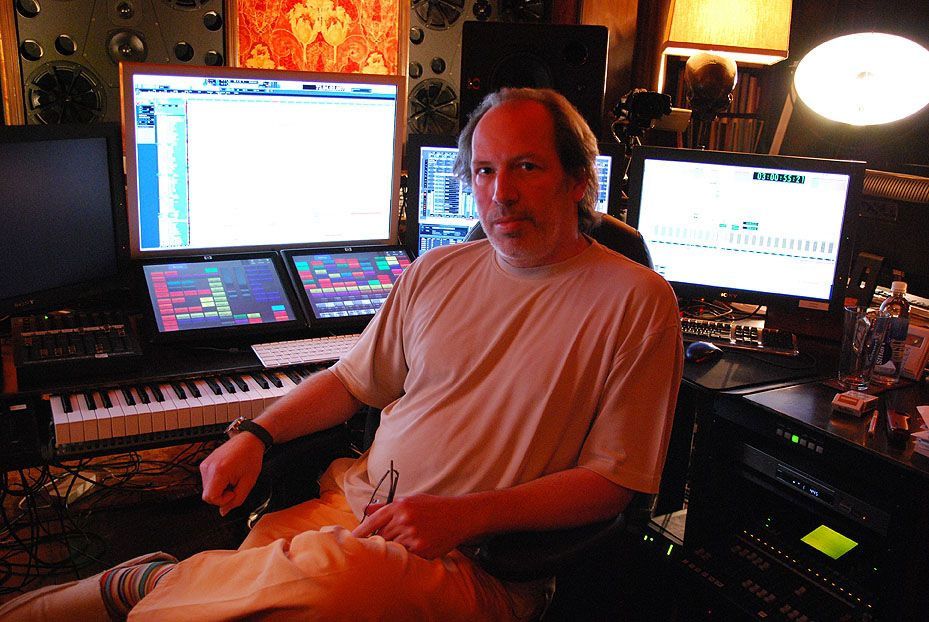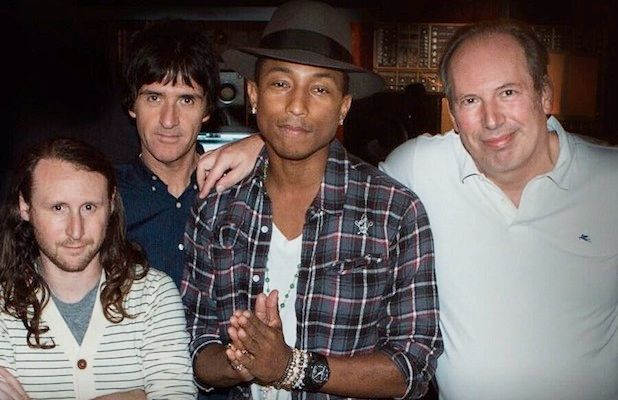Even as Interstellar soared off into the vastness of outer space, composer Hans Zimmer knew a large part of his job was to keep the epic journey intimate.
Along with a lengthy filmography that includes The Lion King, Gladiator, The Pirates of the Caribbean and 12 Years a Slave, Zimmer has also enjoyed a fruitful relationship with Interstellar director Christopher Nolan, having scored the Dark Knight trilogy, Inception and the Nolan-produced Man of Steel.
In an interview with SPINOFF ONLINE, the Oscar, Golden Globe and Grammy winner reveals some of the secrets to his increasingly iconic relationship with Nolan, maintaining his musical inspiration, and keeping his themes for modern-day superheroes emotionally grounded.
Spinoff: After the amount of collaborations you've had with Christopher Nolan, tell me what you think he brings out in you and your music. Or, what he allows you to do that makes the collaboration just work.
Hans Zimmer: It's sort of funny, because often I get the question, "Why are your scores with Chris Nolan sounding so great?" Well, the answer's in the question, isn't it? It's the two of us together. But to be serious about the answer, there's a thing Chris does, which is he's really fierce about protecting my environment; what I mean by that is he just wants to make sure that nothing gets in the way of my imagination. The mechanics of filmmaking can become really stifling in a way – even a simple thing of you're writing something to picture and then you get to a cut and you go, "Ah, God. Now I've gotta go over there and de de de …" rather than writing pure story and pure music. So the way he and I work – and remember he is a writer-director, and there's a huge difference between writer-directors and directors that work from other people's material. Number one, he knows exactly what he's talking about, so when I ask him, even if he has to make it up on the spot, it will be the real story. What I think is really important is we get to develop some of our ideas really early on. I mean, this film was ridiculously early on.
So this idea of setting something into motion together and developing a style for something – I think it's a very different sonic landscape than I've ever used before. I think everything about it is, it is this movie – It can't be any other movie. I don't understand why other people aren't doing it. Just be there on day-minus-one, before anybody even says, "We're going to do this movie." Be there from the beginning. Somewhere in the middle of this process always comes that point where Chris somehow knows more about the music – or talks about the music with great authority, and I talk about the story with great authority – and our conversations cross in a sort of great way where I'm forever protecting story and he's forever protecting music…I know it'll probably be misunderstood, but I keep thinking it's like a band, it's just like a band. We all get together. We all contribute. But we all contribute towards one goal. We might have very different ways of going about it, but we know what we're aiming for. And partly what we're aiming for is to push the boundaries, absolutely, without question.
Zimmer and Junkie XL Splitting Heroes, Scoring Duties on "Batman v Superman"
At the end of the day – I'm sorry, [but] I couldn't care less about critics or awards or any of that stuff. The only thing I care about is: Life out there in the real world is pretty hard, and somebody who works hard, earns their money, and comes and pays their money to go and see our movie, I want to make sure we've pushed every boundary. We've put every idea in. We had sleepless nights. We worked as hard, if not harder. Because that's the only thing that matters is that we can give somebody an experience. If I've done my job right, what will hopefully happen is that I'll let you in through this door, and all the door does is it opens and says "You can experience something right now. I'm not going to tell you what to feel, but I'm just going to say it's okay to feel something and take you on this journey, take you on this adventure."
As prolific as you've been – and this is an industry where there can be a journeyman quality to the work that everyone does, just because it's your job – do you have a method to finding the inspiration to take your work beyond easy paths you might have gone down or formulaic tricks that you've learned through the course of your career and really bring us a new spark of life? Or just simply to challenge yourself each time out?
Do you think this film was a bit of a challenge? [Laughs] Look, I really strongly would not recommend this to anybody, because I never had a musical education. I don't have a drawer full of quotes of Beethoven's and bits and pieces I learned in academia. I think partly a lot of journeyman techniques that you're talking about – it's actually really interesting that you used that phrase, because I know exactly what you mean, and to me, it always is music that sounds slightly academic. Do you know what I mean? It follows all the rules, and it does all the right things.
I have to come at everything from a different perspective. The only perspective I have is, I have to figure out somewhere in the story – I mean, I'm on story all the time, I'm crazy about how on story I am – and within that, I have to figure out what's the part that moves me. Because the good thing about music is, it's sort of like a secret language. I might be writing about something completely tiny and personal, as opposed to – in all three Batman movies, I only wrote about one thing: that moment when the boy sees his parents getting killed, and I just wrote about arrested development. That's what interested me, so that's what I was writing about. The Joker – man, there's a lot of the Joker in me. And in this film, that day one story of Chris coming to me, that thing we talked about, this film's a love letter to my son.
When you do multiple superhero movies, as you've done – on the three biggest and most iconic superheroes – what were the things you keyed in on to differentiate Batman from Superman from Spider-Man?
Man of Steel, really simple: It actually came out of a conversation with Chris, again. I was saying, "I'm so not interested in Superman. I'm so not interested, because any guy who's invincible except for this device of Kryptonite ..." And Chris said, "No, that's not it. If you want to really, really destroy him, break his heart." And I suddenly knew! I was, "Hold on! That is it. Let me write about a character who is sort of outside of society and his ambition is to become more and more human." And so his vulnerability isn't Kryptonite. His vulnerability will have to be his heart in one way or the other. I'm not talking about love-story heart – I'm talking about mom and dad, or just "Wow, how great, let me write about somebody and celebrate that they just want to be a decent human being." So in a funny way, it's an anti-superhero score.
[The Amazing] Spider-Man [2], really simple: I kept thinking there's a great, youthful joy in Peter Parker and sense of humor, and I was thinking, "If I was Peter Parker, I wouldn't be listening to orchestral music. I'd be listening to a band. And it was really interesting for me, to see how much people loved Spider-Man, because I started off with Pharrell [Williams], because he's a friend, saying, "Hey, do you want to come and do this with me?" And then I ran into Johnny Marr in London and he said, "What are you up to?" And I'm going, "Well, I'm going to be doing Spider-Man with Pharrell." He goes "Spider-Man! Oh, I loved Spider-Man ever since I was a kid." We were supposed to have this short little lunch, and we're still in the restaurant at 4 o'clock in the afternoon singing ideas at each other across the table, while the waiters are going, "Can you guys please leave now?"
So I phoned Pharrell and said, "Hey, what about Johnny coming on board?" And by that point, it was like, "OK, we might as well have everybody." It was super-energetic. The Spider-Man sessions were crazy, because everybody was firing on all cylinders, because the great thing about having really smart musicians in the room is if there's a hole, if there's an idea needed, you know everybody else is going to come up with loads of ideas, but everybody wants to come up with the idea. So you have to be on your game all the time. Their egos are all really good that there's a consensus: "Hang on, Johnny's riff is definitely the best riff. OK, we'll go with that." And the whole Electro thing was a lot of fun writing: basically Pharrell and I were writing some crazy opera piece for woodwinds and electronica.
What do you remember of your first meeting with Chris? Did you have a sense that this might be a partnership that was going to go on for a long distance?
We got on really well straight away. But I didn't really want to do Batman, and I think that was actually quite good. It took him a long time to convince me, which meant we had to have a lot of conversations over many, many weeks. And we sort of got to know each other. And I think one of the things I realized is he was steadfast and trustworthy, and I think what's really important in a director is that they have courage and that they're steadfast in their convictions. If you think about the movies we've done, we've never gone a second into overtime. We've never gone over budget. We just did the movies we wanted to make exactly the way we wanted to make them. And he's extraordinarily collaborative in that way. He really, really protects my creative space.
Zimmer on His "Interstellar" Leap of Faith and Scoring a New Batman
At the premiere of Interstellar you told me what the plan was for the Dawn of Justice score and collaborating with Junkie XL, letting him handle the Batman portion of the music. What are you hoping to do with your side of that equation? Where are you hoping to take the Man of Steel music?
Well, right now it's Superman versus Batman, so I need somebody who can hold their own, because I think I'm going to push up against them pretty hard. [Laughs] I don't know – until that blank page screams at me. Right now, I'm sort of still in my Interstellar mode at the moment, and doing a really great little – it's not that little – movie called Chappie, which I just started. But the weird thing about Interstellar is it was such a great experience. It really was. I don't want to quite leave it behind yet.
Is there a style of music or a type of story that you haven't really gotten a chance to tell cinematically that you are very eager to take a crack at?
I don't know what that is yet. You know, what I love is when somebody like Chris comes to me, and I think from that day one it's going to be this small, independent chamber piece about a father and his daughter and then it turns out to be this completely different thing. The moment of discovering what the journey's going to be and going "Woo, we get to go on this journey." I remember when Ronny Howard came to me and said, "Hey, we want to do Rush." I never thought about that I wanted to do a movie about Niki Lauda and James Hunt, and of course it turned out to be this great adventure for us. Or Steve McQueen saying, "Hey, will you come by at nine o'clock in the morning, I want to show you something," and not telling me what it is. And, at nine o'clock in the morning, me seeing 12 Years a Slave, without being forewarned. [Laughs] And Steve going, "Well, what do you think? Are you interested?" And I'm going, "How can I not do this movie? Thank you." And him going, "Well, I didn't really know if--" You know, there's that thing about there are only that many stories. I can never remember how many it is, but it's not that many, right? That might be true. But it's the combination of who is telling the story and where I am in my life which sort of makes it compelling.



